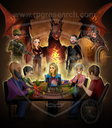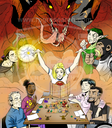Various reference information on this topic
Sorted by Keyword Effect

June 2nd, 12:59 am, 2016. Someone was recently asking again, "what are the benefits of the Wheelchair Friendly RPG Trailer", so I am re-posting it here for others in case you had similar questions and missed the FAQs section of the trailer's website...
Discussion and research links to, concepts of Theory of Mind, and how role-playing games can help people enhance their development related to ToD, and how those with developmental delays can benefit form using RPG to help improve the learning process of repetition necessary for some disiabilities to help them advance in their development...
Role-playing games in one form or another accepted in as many prisons as possible, those that desire rehabilitation and improvement in their prison populations.
Research on RPGs Primer & Don't Split the Party: In response to someone at the Ph.D. level, who recently released a podcast and shockingly made the completely erroneous claims that there is not _any_ existing legtimate, peer-reviewed, research on tabletop RPG, RPGer traits, any correlative data on RPGers, any publications in respected journals, any studies from psychologists or psychiatrists, or any research on the effects of RPGs, I have whipped up this page in order to help. Working together and sharing will help float all boats. Pulling apart and isolating will continue to founder the ship.

I was attending the Professional Issues in Therapeutic Recreation course today, we were going over a chapter regarding the history of Recreation Therapy and Therapeutic Recreation, and the ever-recurring battle over TR vs. RT. This triggered some thoughts regarding the use of a role-playing game (RPG) as a therapeutic intervention modality, namely "Role-playing game Therapy" versus "Therapeutic Role-playing gaming"...

Increasingly heated debate has been growing in recent years about whether role-playing game masters (RPG GMs) should be paid or not. It depends... NOTE: This article focuses on pure entertainment RPG Professionals, not RPG Professionals in educational or therapeutic settings. To be clear, this is a blog posting, as an opinion piece, not a formal essay or research paper. For more formal essays, see the research sections of the site. This informal article is from the first-person experiential perspective, that attempts to include persuasive argument components, as someone involved with RPGs since the 1970s running many sessions per week, and paid as a GM (when desired) since the 1980s.

This questions came up recently on Facebook: "
I've been thinking about the best way to intellectually organize the RPG Research Archives in a way that works for all material, including what is produced and stored here on the website and physical collections, and which also allows for the accessioning of new material as the collections grow.
New archives results by keyword search "Benefit"
New archives results by keyword search "Deficit"
New archives results by keyword search "Benefit"
New archives results by keyword search "Benefit"
New archives results by keyword search "Benefit"

This is an excerpt from the RPG Handbook of Practice book I have been working on. This section is for clients with significant to complete visual impairment due to traumatic brain injury to the occipital lobe. It can be extrapolated for the whole range of visual impairments. The client wants to participate in a non-therapy-setting leisure activity of tabletop role-playing gaming. The Recreation Therapist will need to evaluate and write up the potential challenges and modifications that may be necessary for the client to participate in this activity with as little difficulty as possible....
Testimony about how much the RPG Research repository helped her with research when the university databases were inadequate.
Testimonial about RPG Research from Perring Rynning
Role-Playing games promote a number of positive social aspects, as this LifeHacker article points out. It also shows you how to get started!
Pennsylvania, USA.

There are very few social table-top recreation activities available that are cooperative rather than competitive in nature.

I already regularly run (for free) non-modified role-playing games that include players with Autism Spectrum, Cerebral Palsy, and at-risk youth in the Spokane area. I would like to be able to provide these games to a much broader geographic area, including rural areas, and groups that do not have their own facilities. The Role-playing Gaming trailer will make it possible to provide these sessions to many more people over a much wider area and populace.
In the past 10 years I have been receiving increasingly frequent inquiries about using RPGs in therapeutic settings for older adults. Here is a summary of information to help you get started with this population...
This article provides observation, analysis, and commentary on efforts to "port" face-to-face Tabletop Role-Playing Games (RPG / TRPG) to an online and entertainment medium.

Two Bards Podcast Episode #101 mentions RPG Research and the RPG Research Trailer...

Recently updated the main page's list of goals. Over the next few weeks, I will elaborate on the details of each of those goals. Here is the overview list:
Here is a short list of some key books that are very useful for the APIEDR process.

We have a TR professional panel coming to the university shortly, and we had a teamed class assignment to create questions in advance for the panel, with APA citations, research, etc. Each team member had to create 4 questions. One of my questions was regarding the lack of any effort by the TR industry to use RPG in any format as a recreation therapy intervention modality. It will be a few weeks before the panel meets, but here is the question as submitted to the professor tonight....
Document Actions
